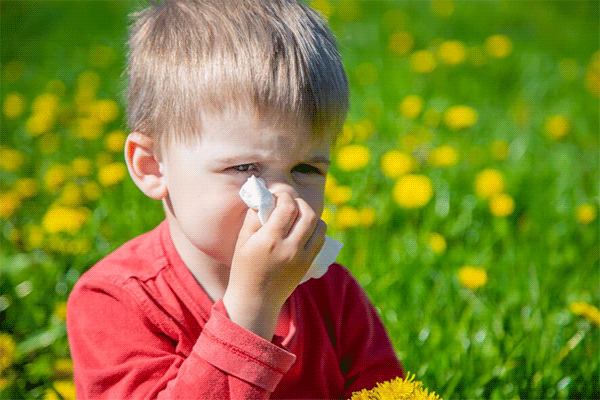★ Early SLIT in children reduces the risk of developing asthma.

Allergic rhinitis as a risk factor for the development of allergic asthma
Allergic rhinitis is a common chronic disease that causes upper respiratory symptoms such as nasal itching, nasal congestion, itchy eyes and sneezing. Consequences include sleep disturbances, lower school performance, lower productivity and lower quality of life.
Allergic rhinitis is known to be an important risk factor for the development of allergic asthma. In approximately 45% of children, the disease progresses to allergic asthma. In addition, the likelihood of poor asthma control increases with the coexistence of allergic rhinitis.
Severe disorders in children due to allergies
Childhood asthma is known to limit children’s daily activities and is associated with increased school absenteeism. In addition, poor asthma control and asthma exacerbations increase the risk of hospitalization. It is therefore not surprising that the coexistence of allergic rhinitis and asthma is associated with higher healthcare costs and lower quality of life.
SLIT reduces symptoms of allergic rhinitis.
A number of studies in children and adolescents have shown that allergen immunotherapy (AIT) can significantly reduce the symptoms of allergic rhinitis and the use of drugs to relieve them. ASIT can be performed subcutaneously or sublingually (SLIT).
When is the optimal time to start SLIT therapy?
The age at onset of allergic rhinitis is known to influence the risk of developing allergic asthma. Thus, it is likely that early initiation of SLIT therapy will benefit children.
Are there benefits to starting SLIT early?
In summary, a recent study examined the clinical and economic benefits of SLIT initiated in early childhood in the treatment of allergic rhinitis to prevent the progression of allergic asthma.
The study included 812 children with moderate to severe seasonal allergic rhinitis caused by an allergy to grass pollen. Of these, 398 received SLIT, which began at different ages (five, seven and twelve years), and 414 children received only therapy to relieve symptoms during the same period. Children were examined for more than 20 years.
Early initiation of SLIT reduces the risk of asthma
Among children who started SLIT therapy at five years, fewer (19%) developed allergic asthma compared with those who started treatment later (24% at seven years and 29% at twelve years).
Reducing healthcare costs through early initiation of SLIT
For children who started SLIT therapy at five years of age, the total health care costs were €20,429 per patient, while for children who started therapy at ages seven and twelve years, the costs were €21,050 and €22,329, respectively. higher.
Source: Gelbe
